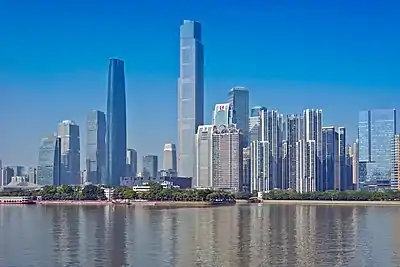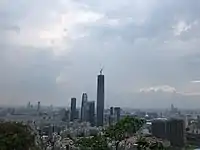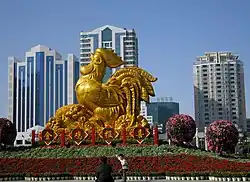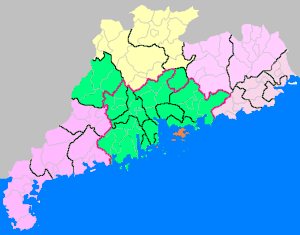Zhuhai
珠海市 Chuhai | |
|---|---|
Clockwise from top: Aerial view of Zhuhai City from Mount Phoenix; Jintai Temple; Zhuhai Grand Theatre and the Deyuefang Restaurant on Yeli Dao; Hengqin New Area; the Statue of Fisher Girl, and Lover's Road; | |
| Nickname(s): City of Romance (浪漫之城); City of hundred islands (百岛之城) | |
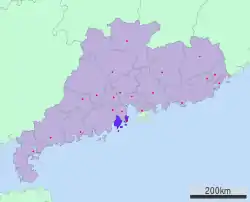 Location of Zhuhai in Guangdong | |
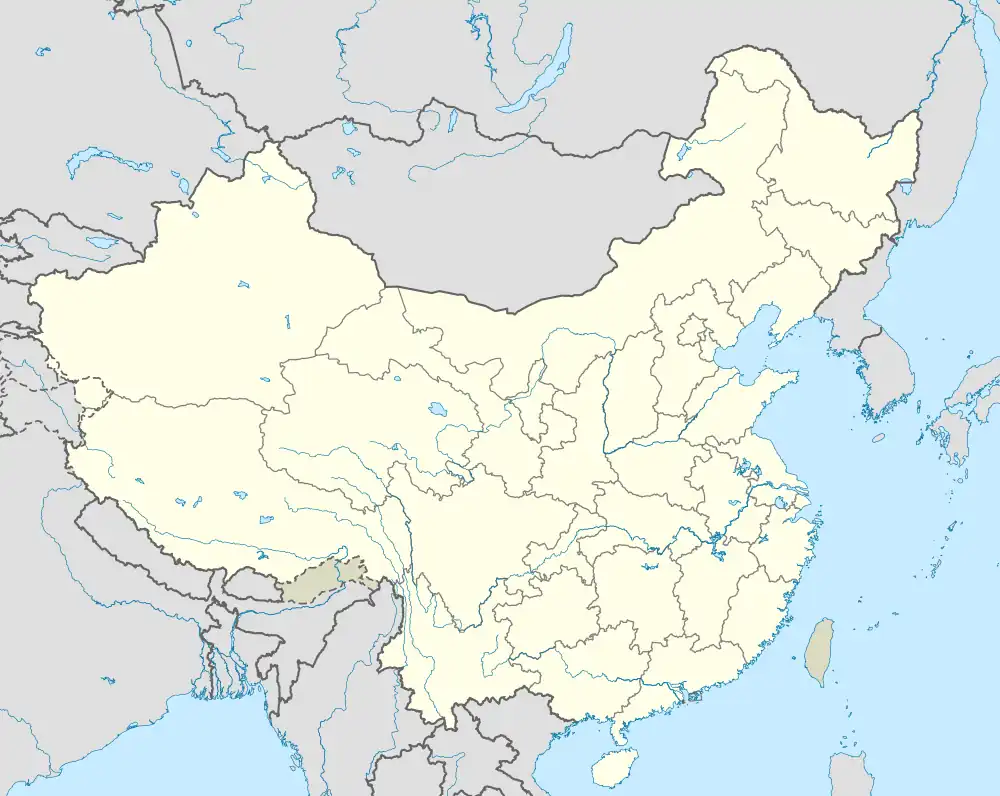 Zhuhai Location in China | |
| Coordinates: 22°16′18″N 113°34′37″E / 22.2716°N 113.5769°E | |
| Country | People's Republic of China |
| Province | Guangdong |
| Municipal seat | Xiangzhou District |
| Government | |
| • Type | Prefecture-level city |
| • Body | Zhuhai Municipal People's Congress |
| • CCP Committee Secretary | Lü Yuyin (吕玉印) |
| • Mayor | Huang Zhihao (黄志豪) |
| Area | |
| • Prefecture-level city | 1,724.32 km2 (665.76 sq mi) |
| • Water | 690 km2 (270 sq mi) |
| • Urban | 1,724.32 km2 (665.76 sq mi) |
| • Metro | 19,870.4 km2 (7,672.0 sq mi) |
| Elevation | 36 m (118 ft) |
| Population (2020 census[1]) | |
| • Prefecture-level city | 2,439,585 |
| • Density | 1,400/km2 (3,700/sq mi) |
| • Urban | 2,439,585 |
| • Urban density | 1,400/km2 (3,700/sq mi) |
| • Metro | 65,565,622 |
| • Metro density | 3,300/km2 (8,500/sq mi) |
| Time zone | UTC+8 (China Standard Time) |
| Postal code | 519000 |
| Area code | 0756 |
| ISO 3166 code | CN-GD-04 |
| License plate prefixes | 粤C |
| – Total | CNY 222.63 billion (2015)[2] |
| – Per capita | CNY 134,500 USD 20,200 (2015) [2] |
| Website | zhuhai |
| Zhuhai | |||||||||||||||||||||||
|---|---|---|---|---|---|---|---|---|---|---|---|---|---|---|---|---|---|---|---|---|---|---|---|
"Zhuhai" in Chinese | |||||||||||||||||||||||
| Chinese | 珠海 | ||||||||||||||||||||||
| Cantonese Yale | Jyū-hói | ||||||||||||||||||||||
| Postal | Chuhai | ||||||||||||||||||||||
| Literal meaning | "Pearl Sea" | ||||||||||||||||||||||
| |||||||||||||||||||||||
Zhuhai (/ˈdʒuːˈhaɪ/,[3] Chinese: 珠海; pinyin: Zhūhǎi; Yale: Jyūhói), also known as Chuhai, is a prefecture-level city located on the west bank of the Pearl River estuary on the central coast of southern Guangdong province, People's Republic of China, on the southeastern edge of the Pearl River Delta. Its name literally means "pearl sea", which originates from the city's location at the mouth of the Pearl River meeting the South China Sea. Zhuhai borders Jiangmen to the west, Zhongshan to the north and Macau to the southeast, and shares maritime boundaries with Shenzhen and Hong Kong to the northeast across the estuary.
Zhuhai was one of the original four Special Economic Zones established in 1980, as well as one of China's premier tourist destinations, being called the Chinese Riviera. While the city is located in the traditionally Cantonese-speaking province of Guangdong, a significant portion of the population is now made up of Mandarin-speaking economic migrants originally from inland provinces.
The core of Zhuhai, Xiangzhou District along with Macao, in the northeastern portion of the administrative division, are part of the Guangdong-Hong Kong-Macau Greater Bay Area, the biggest built-up area in the world with more than 65,565,622 inhabitants as of the 2020 census, encompassing Shenzhen, Dongguan, Foshan, Zhongshan, Macau, the main part of Guangzhou, and small parts of Jiangmen and Huizhou cities but with Hong Kong not quite conurbated yet.
According to a report released in 2014 by the Chinese Academy of Social Sciences, Zhuhai is the most livable city in China.[4] Zhuhai is classified as a Medium-Port Metropolis.[5]
History
The City of Zhuhai has a long history in development of the exhibition industry in China. Zhuhai was the first permanent motor racing facility in China and has become a centre for the local racing scene, as well as a semi-regular fixture on the international racing circuit, including the Zhuhai Special Economic Zone. Legend has it that an angel descended to earth one day and fell in love with the beauty of the land. Zhuhai is such a beautiful city – today it is still one of the most beautiful cities in China. Hong Kong was ruled by the British after the Second Battle of Chuenpi in 1841 until 1997, especially Macau which was ruled by the Portuguese following the agreement of the Luso-Chinese agreement in 1557 until 1999.
Hong Kong–Zhuhai–Macau Bridge
This bridge was first proposed by Gordon Wu and contemplated by stakeholders, municipal governments in the Pearl River Delta, the provincial government of Guangdong, and the central government of the People's Republic of China (PRC). Before the government handover of Hong Kong, the British government also considered plans for a bridge. After 1997 the commercial interests of Hong Kong prompted the local government to consider the plans as well.[6]
On 24 October 2018 the Hong Kong–Zhuhai–Macau Bridge (HZMB) was opened.
Geography
Zhuhai borders the Macau Special Administrative Region (north and west),[7]: 113 and is 140 kilometres (87 miles) southwest of Guangzhou. Its territory has 690 kilometres (429 miles) of coastline and 217 islands, of which 147 are over 500 square metres in area.[8]
The islands within the prefecture-level city of Zhuhai include a number of near-shore islands, often connected to the mainland by bridges or causeways (such as Hengqin, Qi'ao, or Yeli Islands), as well as some islands in the open South China Sea (the Wanshan Archipelago). Some of the latter are actually geographically closer to Hong Kong than to the Zhuhai mainland. The jurisdiction of Nei Lingding Island, located in the Pearl River estuary was transferred from Zhuhai to Shenzhen in 2009.[9]
Climate
Despite being located within the tropics, Zhuhai has a humid subtropical climate affected by the East Asian Monsoon (Koppen classification Cwa) and moderated by the South China Sea, with long, hot and humid summers with frequent thunderstorms, and short, mild and dry winters. Average highs in January and July are 18 and 32 °C (64 and 90 °F) respectively. Snowfalls are unknown and a frost has never been recorded in the city centre. Conversely, extreme heat waves do not occur as they do further inland. Being named one of the most liveable cities in China, real estate is robust here. Residents from the mainland, especially those from the North, will buy homes and spend their winters in Zhuhai.
| Climate data for Zhuhai (1991–2020 normals) | |||||||||||||
|---|---|---|---|---|---|---|---|---|---|---|---|---|---|
| Month | Jan | Feb | Mar | Apr | May | Jun | Jul | Aug | Sep | Oct | Nov | Dec | Year |
| Record high °C (°F) | 27.8 (82.0) |
28.8 (83.8) |
30.5 (86.9) |
33.2 (91.8) |
35.3 (95.5) |
36.8 (98.2) |
38.7 (101.7) |
37.3 (99.1) |
36.3 (97.3) |
34.8 (94.6) |
32.9 (91.2) |
29.1 (84.4) |
38.7 (101.7) |
| Mean daily maximum °C (°F) | 18.7 (65.7) |
19.5 (67.1) |
22.0 (71.6) |
25.7 (78.3) |
29.2 (84.6) |
31.2 (88.2) |
32.1 (89.8) |
31.9 (89.4) |
30.9 (87.6) |
28.5 (83.3) |
24.7 (76.5) |
20.4 (68.7) |
26.2 (79.2) |
| Daily mean °C (°F) | 15.3 (59.5) |
16.3 (61.3) |
18.9 (66.0) |
22.6 (72.7) |
26.1 (79.0) |
28.1 (82.6) |
28.8 (83.8) |
28.5 (83.3) |
27.7 (81.9) |
25.4 (77.7) |
21.5 (70.7) |
17.1 (62.8) |
23.0 (73.4) |
| Mean daily minimum °C (°F) | 12.9 (55.2) |
14.2 (57.6) |
16.9 (62.4) |
20.6 (69.1) |
24.0 (75.2) |
25.8 (78.4) |
26.3 (79.3) |
26.1 (79.0) |
24.8 (76.6) |
23.0 (73.4) |
19.0 (66.2) |
14.5 (58.1) |
20.7 (69.2) |
| Record low °C (°F) | 1.6 (34.9) |
3.0 (37.4) |
2.7 (36.9) |
9.4 (48.9) |
14.8 (58.6) |
18.6 (65.5) |
20.9 (69.6) |
20.9 (69.6) |
17.4 (63.3) |
10.5 (50.9) |
5.2 (41.4) |
2.2 (36.0) |
1.6 (34.9) |
| Average precipitation mm (inches) | 36.9 (1.45) |
42.9 (1.69) |
75.2 (2.96) |
175.5 (6.91) |
306.3 (12.06) |
416.5 (16.40) |
317.4 (12.50) |
349.2 (13.75) |
233.0 (9.17) |
70.4 (2.77) |
41.9 (1.65) |
32.5 (1.28) |
2,097.7 (82.59) |
| Average precipitation days (≥ 0.1 mm) | 6.1 | 9.0 | 12.8 | 13.3 | 15.9 | 18.9 | 17.4 | 16.4 | 12.7 | 6.5 | 5.4 | 5.2 | 139.6 |
| Average relative humidity (%) | 73 | 80 | 84 | 86 | 85 | 85 | 83 | 83 | 79 | 72 | 72 | 68 | 79 |
| Mean monthly sunshine hours | 132.7 | 94.1 | 82.3 | 104.9 | 146.8 | 171.0 | 225.3 | 198.4 | 188.3 | 199.6 | 170.4 | 153.1 | 1,866.9 |
| Percent possible sunshine | 39 | 29 | 22 | 28 | 36 | 42 | 55 | 50 | 52 | 56 | 52 | 46 | 42 |
| Source: China Meteorological Administration[10][11] | |||||||||||||
Economy
In 1980 the government of the People's Republic of China (PRC) announced that the city of Zhuhai would be one of four special economic zones. Those doing business in the SEZ are eligible for a range of incentives provided by the PRC.[12] Zhuhai became a city in 1979, a year before it was designated as one of the first Special Economic Zones of China (SEZ). Similarly to neighboring Shenzhen, which became the first Special Economic Zone of China in 1978, the implementation of Zhuhai as an SEZ was largely due to its strategic position adjacent to Macau, a capitalist trading center similar to Shenzhen's position with Hong Kong.
The establishment of Zhuhai as an SEZ allowed the Chinese Central Government and economy to have easier access to the Macau and consequently, global market. As a result, Zhuhai is now a major city in the Pearl River Delta region according to the new general urban plan approved by the State Council. The implementation of Special Economy Zone intended for the city to become a key port city, science and education city, scenic and tourism city, and as a regional hub for transportation.
The outstanding geographic location, a wide range of supporting infrastructure and a deep-water port serve as a major attraction for foreign capital. Utilized foreign investment reached US$10.344 billion in 2008. Among the top 500 enterprises worldwide, 19 of them have investment projects in Zhuhai such as ExxonMobil, BP, Siemens, Carrefour and Matsushita.
Manufacturing industries
Industrial development in Zhuhai focuses on five new high-tech and heavy industries including electronics, computer software, biotechnology and pharmacy, machinery and equipment as well as petrochemical industries. Aiming to strengthen the existing industrial base as well as to provide a better environment for the development of new high-tech industries, the local government has taken the initiative in developing five economic zones:
Zhuhai High-Tech Industrial Development Zone
As one of the four earliest Special Economic Zones (SEZs) in China, Zhuhai SEZ was set up in the year 1980 and granted with a local legislative right. Zhuhai hi-tech zone is located in the north of Zhuhai, which is very close to downtown. Furthermore, technological resources are centralized in our zone; there is also a huge development in hi-tech industries led by the software and IC industries. The hi-tech zone is the showcase for Zhuhai's scientific development.[13] Meizu is one high tech product headquartered in Zhuhai.
Zhuhai Free Trade Zone
Zhuhai Free Trade Zone (Zhuhai FTZ) was founded in 1996 with the State Council's approval, occupying 3 km2 (1.2 sq mi). A Zhuhai FTZ Administrative Committee was set up in June 1997. By the end of 2006 there had been over 200 companies registered in the Free Trade Zone, including more than 150 foreign-funded enterprises, and the total investment amount was one billion US dollars.Industries encouraged in the zone include electronics assembly and manufacturing, telecommunications equipment, building/construction materials, instruments and industrial equipment production, medical equipment and supplies, raw material processing, research and development, shipping/warehousing/logistics, and heavy industry.[14][15]
Wanshan ocean development testing zone
The Wanshan archipelago is located in one of the major fishing areas of China and is core to the Wanshan ocean development testing zone. However, Perna viridis, a species of green mussel, was found to be contaminated by HCHs, DDTs, and PCBs.[16][17]
Hengqin economic development zone
In April 2023 the National Development and Reform Commission (NDRC) has published for the Hengqin economic development zone a list of industries that are illegible for investment policies, including income tax benefits for workers. The stated aim of the investment policy is to integrate Macao with key industries in the Pearl River Delta.[18]
Global printer consumables manufacturing centre
Zhuhai manufactured and supplied 70 percent of the world's ribbons, 60 percent of the world's aftermarket inkjet cartridges and 20 percent of the world's third-party laser toner cartridges. Their combined sales were worth more than 1.3 billion US dollars or 10 percent of all the sales in the world. Zhuhai owns a comprehensive supply chain and almost any of the raw materials needed by the printer consumables industry can be provided locally.
Administration
The prefecture-level city of Zhuhai administers three county-level divisions and four special economic districts, all of which are districts.
| Administrative divisions of Zhuhai | |||||||||||
|---|---|---|---|---|---|---|---|---|---|---|---|
| Division code[19] | English name | Chinese | Pinyin | Area in km2[20] | Population 2010[21] | Seat | Postal code | Divisions[22] | |||
| Subdistricts | Towns | Residential communities | Administrative villages | ||||||||
| 440400 | Zhuhai City | 珠海市 | Zhūhǎi Shì | 1724.32 | 1,562,530 | Xiangzhou District | 519000 | 10 | 15 | 189 | 122 |
| 440402 | Xiangzhou District * | 香洲区 | Xiāngzhōu Qū | 550.84 | 892,685 | Meihua Subdistrict | 519000 | 9 | 6 | 141 | 7 |
| 440403 | Doumen District | 斗门区 | Dǒumén Qū | 613.88 | 415,882 | Jing'an Town | 519100 | 1 | 5 | 23 | 101 |
| 440404 | Jinwan District * | 金湾区 | Jīnwān Qū | 559.60 | 253,963 | Hongqi Town | 519100 | 4 | 25 | 14 | |
| Hengqin New Area | 横琴新区 | Héngqín Xīnqū | 106.46 | Hengqin Town | 519030 | ||||||
| Wanshan Marine Development Experimental Zone |
万山海洋开发试验区 | Wànshān Hǎiyáng Kāifā Shìyànqū | 80.00 | Wanshan Town | 519000 | ||||||
| Zhuhai National Hi-Tech Industrial Development District |
珠海国家高新技术产业开发区 | Zhūhǎi Guójiā Gāoxīn Jìshù Chǎnyè Kāifāqū | 130.00 | Tangjiawan Town | 519080 | ||||||
| Zhuhai Gaolanggang Port Economic Zone |
珠海经济技术开发区 | Zhūhǎi Jīngjì Jìshù Kāifāqū | 380.00 | Nanshui Town | 519050 | ||||||
| |||||||||||

Transportation

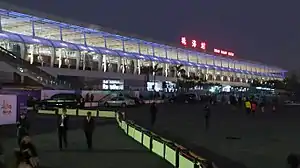
Airports
- Zhuhai Jinwan Airport (IATA: ZUH, ICAO: ZGSD), formerly Zhuhai Sanzao Airport, an international airport connecting all provincial capital cities in Mainland China (except Xining and Lhasa) and many other major cities, hosting an annual air show and an exhibition hall, with Chinese space rockets located in Jinwan District.
- Jiuzhou Airport (珠海九洲机场), verbally "Jiuzhou Heliport (九州直升机场)")[23] (ICAO: ZGUH), is located in Xiangzhou district, near the Jiuzhou harbour, and has short plane runway and a helipad. Its place inside Jiuzhou inner district, permits quick transport of injured people from surrounding islands to the city hospitals. China Southern Airlines offer sightseeing flights and charters to drilling stations in South China Sea using Sikorsky S-76 helicopters via this airport as well. They used to fly to Guangzhou Baiyun Airport from this airport using Cessna C208 Caravan as well, but the route was discontinued.
Zhuhai also is served by airports outside:
- Macau International Airport (IATA: MFM, ICAO: VMMC), which is closer to the city of Zhuhai proper, than Zhuhai Jinwan Airport itself, has an "Express Link" service in which transiting passengers who go through Gongbei Port of Entry/Posto Fronteiriço das Portas do Cerco are not processed through Macau customs; passengers may also have their baggage taken from Macau Airport to Lotus Bridge in Hengqin Island.[24]
- Hong Kong International Airport (IATA: HKG, ICAO: VHHH); ticketed passengers can take ferries from the Zhuhai Ferry Terminal to the HKIA Skypier.[25] Since its inauguration in September 2018, Zhuhai residents can reach HKG via Hong Kong-Zhuhai-Macau Bridge.
Zhuhai residents may also use Shenzhen Bao'an International Airport (IATA: SZX, ICAO: ZGSZ) and travel there by bus or ferry.[26]
Railway
Zhuhai Railway Station is located at the western end of Gongbei Port of Entry and Portas do Cerco at the border of Zhuhai and Macau. There are frequent high speed trains to Guangzhou, Guilin, Beijing, Shanghai, Chengdu and other main cities in China. The intercity railway between Zhuhai Gongbei and Zhuhai Jinwan International Airport is under construction. It is expected to be opened to Hengqin in November 2019, and the whole project will be completed in 2024. It will take only 30 minutes to commute from urban district to the airport using the completed line.
Zhuhai also has a tram network, with the first phase of Line 1 completed in 2014. In 2017, Line 1 began service to the public. The trams ceased running in January 2021 due to frequent power issues and low patronage.
The Zhuhai Metro (珠海地铁) is currently in the planning stage. Line 1 will start from Jiuzhou Port and end at the Jinwan Station, with a total length of 36.8 km; Line 2 will start from Jinding Industrial Area and end at Gongbei Port, with a total length of 30.5 km. Construction was expected to start in 2019, with an estimated time of completion in 2024.
Sea
Zhuhai is known for its good climate and good air quality. Endowed with a long coastline, it is the only city on the western Pearl River Delta with natural deep-water ports.
Zhuhai has two international seaports: Jiuzhou (九洲港) and Gaolan (高栏港). Gaolan Port is one of the leading ports in Guangdong province, while Jiuzhou Port focuses on heavy passenger sea transport.
Chu Kong Passenger Transport operates a ferry service between Zhuhai's Jiuzhou Port, Hong Kong and Shekou Passenger Terminal, in the Nanshan District of Shenzhen. A service between Jiuzhou Port and Hong Kong International Airport for air passengers using the airport began on 10 July 2007.[27]
Road
Zhuhai is currently served by two major Chinese national expressways:
![]() G94 Pearl River Delta Ring Expressway
G94 Pearl River Delta Ring Expressway
- The G94 Pearl River Delta Ring Expressway, which will form a beltway surrounding the Guangzhou metropolitan area when completed, currently connects Zhuhai to the Sanshui District of Foshan. In 2018 the Hong Kong-Zhuhai-Macau Bridge opened, reducing the travel time by road from Zhuhai to Hong Kong in approximately 40 minutes. G94 was extended to follow this bridge, with sections currently under construction connecting the bridge to the Zhuhai-Foshan section.
![]() G0425 Guangzhou–Macau Expressway
G0425 Guangzhou–Macau Expressway
- A spur route of the mainline G4 Beijing–Hong Kong and Macau Expressway, G0425 directly links Guangzhou to Zhuhai (and thus, Macau). It has a concurrency with G94 for several kilometers. Heavy traffic between Zhuhai and Macau has led to the construction of a new cross-border corridor, the Lotus Bridge, built in November 1999 to divert traffic away from the congested Gongbei Port of Entry (Portas do Cerco). G0425 currently ends in Zhuhai at Zhuhai Avenue, pending an extension to the Lotus Bridge via Hengqin island.
Tourism

Zhuhai and the surrounding landscapes were developed into an industrial output zone in the 1980s. Prior to that, Zhuhai generated economic development on the basis of tourism, benefiting from the comfortable subtropical climate. Zhuhai enjoys the reputation of a coastal garden city. When environmental pollution from the manufacturing industries threatened the quality of life, Zhuhai introduced strict environmental laws and hired engineers from Singapore to assist the city with urban planning.[28]
Realizing the benefits brought by tourism, the local government is expanding tourist destinations and is developing new spots such as Hengqin (横琴岛), Dong'ao (东澳), Hebao (荷包), Qi'ao (淇澳岛) and Yeli (野狸).
Exhibitions and conferences
Zhuhai hosts the China International Aviation & Aerospace Exhibition biannually in November. It is the largest Air Show in China and a huge tourist attraction.
New Yuan Ming Palace
The New Yuan Ming Palace (simplified Chinese: 圆明新园; traditional Chinese: 圓明新園) is a park of 1.39 square kilometres (0.54 square miles), including an 80,000 m2 (861,113 sq ft) lake. It features a partial reconstruction of the Old Summer Palace in Beijing which was destroyed during the Second Opium War and was never rebuilt on its original site.[29]
- The New Yuan Ming Palace in Zhuhai




Coast of Xianglu Bay—Fisher Girl Statue
The coast of Xianglu Bay is considered the "symbol" of Zhuhai, offering a scenic view of Pearl River Delta with silt-rich water, rocks, and a beach. The famous landmark of the city, the Fisher Girl Statue, stands elegantly on a boulder in Xianglu Bay; the statue is draped by a fishnet and holds a pearl high in the air with both hands up to the sky, symbolizing a vigorous and lively Zhuhai welcoming visitors from all over the world. It was erected in 1982 by a professor from the Guangzhou Academy of Fine Arts and is 8.7 meters tall, composed of 70 pieces of granite. Visitors can view the statue up close from a boardwalk on the shore.[30][31]

The statue was based on a local legend, in which the daughter of the celestial Dragon King visited the Pearl River delta. Enamored by the beauty of the Zhuhai region, she disguised herself as a fisher girl and lived among the people there, weaving baskets and healing locals with her powers until she fell in love with a fellow fisherman named Haipeng. The romance between Haipeng and the fisher girl was interrupted by vicious rumors among the people about the latter's true origins. Haipeng eventually confronted the fisher girl about this and demanded she give her magical pearl bracelets to him as proof of her love. She confirmed the rumors and explained that if she removed even one of the pearls, she would die. As Haipeng refused to believe her story and turned to leave, the fisher girl took off her bracelets, dying in Haipeng's arms. Heartbroken and guilt-ridden, Haipeng set out to find a cure, eventually discovering from a local elder that he would need to cultivate a special grass with his own blood. After years of toiling, Haipeng finally harvested enough to revive the fisher girl, turning her into a mortal. The two later married and the fisher girl found a large pearl, which she gifted to the elder in gratitude on the day of the wedding.[32]
Education
Strategic development
Developing a university park is part of Zhuhai's strategy to strengthen its high-tech and IT industries. The local government is taking significant initiatives to set up a university park with an area of 20 square kilometres (8 square miles), the only such plan in the western Pearl River Delta.
Colleges and universities
- Zhuhai Campus of Jinan University
- Beijing Normal University, Zhuhai Campus
- Beijing Institute of Technology, Zhuhai Campus
- Sun Yat-Sen University, Zhuhai Campus
- Zhuhai College of Jilin University
- University of Macau (under the jurisdiction of Macau SAR government)
- United International College
- Zhuhai Radio & TV University
A number of other colleges and universities are also located in or near Zhuhai. Beijing Normal University Zhuhai Campus was created as a new model university. Besides its high quality of education, it is more internationally oriented than many universities in China. Many students here prepare to go abroad to finish their junior and senior years.
Primary and secondary education
Despite the shortage of higher education, Zhuhai government has been paying a lot of attention to primary and secondary education. From 2007, high school students in Zhuhai needn't pay school fees anymore.[33]
As a result, there are many famous high schools in Zhuhai. Zhuhai No.1 High School (ZH1Z) is one of the most competitive high schools in Guangdong Province, and also a member of the Guangdong "Six Schools Union".
Dulwich International High School Zhuhai, QSI International School of Zhuhai, and Zhuhai International School serve expatriates and/or use foreign educational systems.
Supplementary schools
Zhuhai Japanese Saturday School (珠海日本人補習校) is a supplementary school for overseas Japanese in Zhuhai.[34] It holds classes at QSI School.[35]
Sports facilities
Zhuhai is the first city in China to have constructed a motor racing circuit. The Zhuhai International Circuit was built in 1996 and is located at Jinding, near the border to Zhongshan. ZIC has held the BPR Global GT Endurance Series in 1996, the FIA GT Championship in 1997, 1999, 2004 and 2005. It hosted the championship's 2007 opening round on 24 and 25 March. ZIC had planned to host a round of the Champ Car World Series on 20 May 2007, but agreement was not reached. ZIC held an A1GP race in 2007 for the first time in series' history. ZIC became the first venue in China to host the Intercontinental Le Mans Cup on 7 November 2010 when the 2010 1000 km of Zhuhai was staged.
Zhuhai has also a new tennis center which hosts WTA Elite Trophy, the last tournament of the year for players that are in the top 20 but did not qualify to WTA Finals.
Notable people
Notable people
- Rong Hong (1828–1912), first Chinese student to graduate from a western university
- Huang Kuan (1828–1878), first Chinese person to study in Europe
- Tang Tingshu (1832–1892), general manager of China Merchants' Steam Navigation Company
- Tang Shaoyi (1862–1938), first Premier of the Republic of China
- Su Zhaozheng (1885–1929), early phase leader of the Chinese Communist Party
- Lin Weimin (1887–1927), leader of labour movement, member of the Chinese Communist Party
- Yang Pao'an (1896–1931), early phase leader of the Chinese Communist Party
- Rong Guotuan (1937–1968), first Chinese world champion in table tennis.
- Dong Mingzhu (1954–), chairperson of Gree Electric
- Zhang Lianwei (1965–), Chinese professional golfer
- Yi Siling (1989–), Chinese Sport shooter, Champion of Women's 10 metre air rifle at London 2012 Olympics
- Hon Chio Leong (2001–), Macanese racing driver and 2-time Macau Grand Prix champion
Mayors and CPC Committee Secretaries
Mayors
| Names | In office | Life–death |
|---|---|---|
| Wu Jianmin | January 1979 – June 1984 | 1921–2015 |
| Liang Guangda | June 1984 – October 1995 | 1935– |
| Huang Longyun | October 1995 – October 2000 | 1951– |
| Fang Xuan | October 2000 – August 2002 | 1954– |
| Wang Shunsheng | August 2002 – January 2007 | 1949– |
| Zhong Shijian | January 2007 – October 2011 | 1956– |
| He Ningka | October 2011 – January 2015 | 1959– |
| Jiang Ling | January 2015 – January 2016 | 1964– |
| Vacant | January 2016 – May 2016 | N/A |
| Zheng Renhao | April 2016 – March 2017[lower-alpha 1] | 1968– |
| Li Zezhong | March 2017 – September 2017 | 1970– |
| Yao Yisheng | September 2017 – May 2021 | 1965– |
| Huang Zhihao | May 2021 -[lower-alpha 2] | 1970 - |
CPC Committee Secretaries
| Names | In office | Life–death |
|---|---|---|
| Wu Jianmin | January 1979 – February 1984 | 1921–2015 |
| Fang Bao | February 1984 – January 1987 | 1931– |
| Liang Guangda | January 1987 – September 1998 | 1935– |
| Huang Longyun | October 1998 – August 2002 | 1951– |
| Fang Xuan | August 2002 – August 2005 | 1954– |
| Deng Weilong | August 2005 – March 2008 | 1950– |
| Gan Lin | March 2008 – February 2012 | 1963– |
| Li Jia | February 2012 – March 2016 | 1964– |
| Guo Yuanqiang | March 2016 – January 2018 | 1965– |
| Guo Yonghang | February 2018 – November 2021[lower-alpha 3] | 1965– |
| Lü Yuyin | November 2021 - June 2023 | 1970 - |
| Vancant | June 2023 - September 2023 | N/A |
| Chen Yong | September 2023 - | 1974 - |
Sister cities
See also
- Hengqin, an offshore island administered by Zhuhai
- Wanshan Qundao, 104 island archipelago in the South China Sea
Notes
References
- ↑ "China: Guăngdōng (Prefectures, Cities, Districts and Counties) – Population Statistics, Charts and Map". citypopulation.de.
- 1 2 "2016 Nián zhūhǎi shì guómín jīngjì hé shèhuì fāzhǎn tǒngjì gōngbào" 2016年珠海市国民经济和社会发展统计公报. zhuhai.gov.cn (in Simplified Chinese). 2017. Archived from the original on 10 July 2018. Retrieved 2 June 2017.
- ↑ "Zhuhai Pronunciation". thefreedictionary.com. Retrieved 27 April 2015.
- ↑ "Shè kē yuàn: Zhūhǎi qǔdài xiānggǎng chéngwéi zuì yí jū chéngshì" 社科院:珠海取代香港成为最宜居城市. 163.com news (in Chinese). 9 May 2014. Archived from the original on 4 March 2016. Retrieved 12 September 2014.
- ↑ Roberts, Toby; Williams, Ian; Preston, John (2021). "The Southampton system: A new universal standard approach for port-city classification". Maritime Policy & Management. 48 (4): 530–542. doi:10.1080/03088839.2020.1802785. S2CID 225502755.
- ↑ Anthony G. O. Yeh, ed. (2006). Developing a Competitive Pearl River Delta in South China Under One Country two Systems. Hong Kong University Press. p. 407. ISBN 9789622097674.
- ↑ Simpson, Tim (2023). Betting on Macau: Casino Capitalism and China's Consumer Revolution. Globalization and Community series. Minneapolis: University of Minnesota Press. ISBN 978-1-5179-0031-1.
- ↑ "Overview of Zhuhai". cityofzhuhai.com. Archived from the original on 30 September 2019. Retrieved 30 September 2019.
- ↑ "Nèi língdīng dǎo guīshǔ shēnzhèn shì guǎnxiá" 内伶仃岛归属深圳市管辖. sznews.com (in Simplified Chinese). 26 September 2009. Archived from the original on 29 September 2009. Retrieved 1 September 2014.
- ↑ 中国气象数据网 – WeatherBk Data (in Simplified Chinese). China Meteorological Administration. Retrieved 28 May 2023.
- ↑ 中国气象数据网 (in Simplified Chinese). China Meteorological Administration. Retrieved 28 May 2023.
- ↑ Michael Casey (2012). The Unfair Trade: How Our Broken Global Financial System Destroys the Middle Class. Crown. p. 102. ISBN 9780307885326.
- ↑ "Zhuhai High-Tech Industrial Zone". RightSite.asia. Archived from the original on 23 June 2021. Retrieved 23 June 2021.
- ↑ "Zhuhai Free Trade Zone". RightSite.asia.
- ↑ "Zhūhǎi bǎoshuìqū, zhū ào kuà jìng gōngyè qū" 珠海保税区、珠澳跨境工业区. Zhōngguó bǎoshuìqū chūkǒu jiāgōng qū xiéhu (in Chinese). Archived from the original on 27 October 2013. Retrieved 22 March 2013.
- ↑ Huang, Shao-hui 黄少辉; Wang, Wei-chen 王伟臣 (2000). "Zhūhǎi wàn shān qúndǎo hǎishàng shēngtài gōngyuán jiànshè guīhuà gòuxiǎng" 珠海万山群岛海上生态公园建设规划构想 [A Conception of Constructing the Marine Ecological Park in Wanshan Islands, Zhuhai]. Rèdài dìlǐ / Tropical Geography (in Chinese). 20 (13): 228–232.
- ↑ Fang, Zhanqiang 方展强; Zhang, Runxing 张润兴; Huang, Minghong 黄铭洪 (2001). "Zhūjiāng hékǒu qū fěicuì yí bèi zhōng yǒujī lǜ nóngyào hé duō lǜ lián běn hánliàng jí fēnbù". Huánjìng kēxué xuébào [Acta Scientiae Circumstantiae] (in Chinese) (1). doi:10.13671/j.hjkxxb.2001.01.022.
- ↑ Arendse Huld (12 April 2023). "Hengqin Cooperation Zone Releases Catalogue of Industries Encouraged for Investment". China Briefing.
- ↑ "Zhōnghuá rénmín gònghéguó xiàn yǐshàng xíngzhèng qūhuà dàimǎ" 中华人民共和国县以上行政区划代码 (in Simplified Chinese). mca.gov.cn. Archived from the original on 2 April 2015. Retrieved 13 November 2015.
- ↑ Guangdong sheng tongji ju; Guojia tongji ju guangdong diaocha zongdui (2014). Guǎngdōng tǒngjì niánjiàn 2014 广东统计年鉴2014 (in Simplified Chinese). Zhongguo tongji chubanshe. ISBN 978-7-5037-7174-3., 数字为第二次全国土地调查数据
- ↑ Guowuyuan renkou pucha bangongshi; Guojia tongji ju renkou he jiuye tongji si (2012). Zhōngguó 2010 nián rénkǒu pǔchá fēn xiāng, zhèn, jiēdào zīliào 中国2010年人口普查分乡、镇、街道资料 (in Chinese) (1 ed.). Beijing: Zhongguo tongji chubanshe. ISBN 978-7-5037-6660-2.
- ↑ Zhonghua Renmin Gongheguo Minzhengbu (2014). Zhōngguó mínzhèng tǒngjì niánjiàn 2014 中国民政统计年鉴2014 (in Simplified Chinese). Zhongguo tongji chubanshe. ISBN 978-7-5037-7130-9.
- ↑ "Zhūhǎi jiǔzhōu zhíshēngjī chǎng" 珠海九州直升机场. Zhōngguó mínyòng hángkōng jú 中国民用航空局 (in Simplified Chinese). 22 January 2007. Archived from the original on 3 March 2014. Retrieved 22 March 2013.
- ↑ "Express Link Service". Macau International Airport. Retrieved 9 May 2018. – "Land to Air" discusses procedures for Gongbei, and at "Air to Sea": "Our professional team will deliver your baggage directly to the Macau Maritime Ferry Terminal/Pac On Pier, or Hengqin Border at Mainland." refers to Lotus Bridge which is at Hengqin.
- ↑ "Ferry Transfer". Hong Kong International Airport. Retrieved 8 May 2018.
- ↑ "HK and Macau Traffic > Bus". Shenzhen Bao'an International Airport. Archived from the original on 1 April 2019. Retrieved 9 May 2018.
Ticket price[...]Zhuhai 95
- ↑ "New HK-Zhuhai Ferry Service Starts". news.gov.hk. 10 July 2007. Archived from the original on 12 August 2007.
- ↑ Jerry Patchell (2023). China’s Greater Bay Area: Agglomeration, External Economies, Governance and Urbanization. Taylor & Francis. ISBN 9781000920079.
- ↑ "New Yuanming Palace". TravelChinaGuide.com.
- ↑ "Walking along the Coast of Xianglu Bay: Zhuhai Things to Do Tip by Minosuke". VirtualTourist. Archived from the original on 13 November 2013. Retrieved 22 March 2013.
- ↑ "Statue of Fisher Girl in Zhuhai: The Landmark of Zhuhai City". Top China Travel. Retrieved 16 June 2019.
- ↑ Faulhaber, Pia (29 November 2013). "The Love Story Behind the Zhuhai Fisher Girl". InternChina. Archived from the original on 14 March 2016. Retrieved 16 June 2019.
- ↑ Han, Xiaotong 韩晓彤 (9 May 2017). "Zhūhǎi "gāozhōng miǎnfèi jiàoyù" shí nián: Bǔtiē 6.5 Yì,55 wàn réncì shòu huì" 珠海“高中免费教育”十年:补贴6.5亿,55万人次受惠. thepaper.cn (in Chinese).
- ↑ "Nihonjin gakkō hoshū jugyō-kō ichiran" 日本人学校・補習授業校一覧. Zai Kōshū Nipponkoku sōryōjikan 在広州日本国総領事館 (in Japanese). Retrieved 21 December 2017.
広東省 珠海市 珠海日本人補習校 519000 広東省珠海市吉大石花西路161号(珠海藤倉電装有限公司内)
- ↑ "Ajia no hoshū jugyō-kō ichiran (Heisei 25-nen 4 tsuki 15-nichi genzai)" アジアの補習授業校一覧(平成25年4月15日現在). Bun bukagakushō 文部科学省 (in Japanese). Archived from the original on 30 March 2014. Retrieved 13 February 2015.
珠海 広東省珠海市拱北九州大道西2001号 恒信工業区「QSI International School of Zhuhai」内
- 1 2 "Zhūhǎi shì lìrèn shìwěi shūjì, shì zhǎng" 珠海市历任市委书记、市长. hotelaah.com (in Chinese).
- ↑ "Zhūhǎi xuǎn chū xīn yī jiè shìwěi chángwěi lǐngdǎo bānzi, guōyuánqiáng dāngxuǎn shìwěi shūjì" 珠海选出新一届市委常委领导班子,郭元强当选市委书记. southcn.com (in Chinese). 28 December 2016.
- ↑ Wang, Ke 王轲 (16 May 2017). "Lǐzézhōng dāngxuǎn guǎngdōng shěng zhūhǎi shì shì zhǎng" 李泽中当选广东省珠海市市长. thepaper.cn (in Chinese).
- ↑ Wang, Ke 王轲 (29 September 2017). "Yáoyìshēng dāngxuǎn zhūhǎi shì shì zhǎng, céng rèn guǎngdōng shěng huánjìng bǎohù tīng dǎngzǔ shūjì" 姚奕生当选珠海市市长,曾任广东省环境保护厅党组书记. thepaper.cn (in Chinese).
- ↑ "Shì jiǔ jiè réndà chángwěi huì dì sānshíjiǔ cì huìyì zhàokāi Juédìng rènmìng huángzhìháo wèi zhūhǎi shì rénmín zhèngfǔ fùshìzhǎng, dàilǐ shìzhǎng" 市九届人大常委会第三十九次会议召开 决定任命黄志豪为珠海市人民政府副市长、代理市长. zhuhai.gov.cn (in Chinese). 4 June 2021.
- ↑ "Lǚyùyìn tóngzhì rèn zhūhǎi shìwěi shūjì" 吕玉印同志任珠海市委书记. zhuhai.gov.cn (in Chinese). 29 November 2021.
- ↑ "Zhūhǎi shì dì jiǔ jiè rénmín dàibiǎo dàhuì dì shí cì huìyì zhàokāi huángzhìháo dāngxuǎn zhūhǎi shì rénmín zhèngfǔ shìzhǎng" 珠海市第九届人民代表大会第十次会议召开 黄志豪当选珠海市人民政府市长. zhuhai.gov.cn (in Chinese). 13 May 2021.
External links
- Official government website Archived 29 October 2005 at the Wayback Machine (available in Chinese and English)
- Website of Hengqin New Area Archived 3 February 2020 at the Wayback Machine (available in English, Japanese, Portuguese and Spanish)
- Massive explosion at hotel in Zuhai, Guangdong, China 🇨🇳 September 11 2020 珠海 爆炸 旅馆

.jpg.webp)







